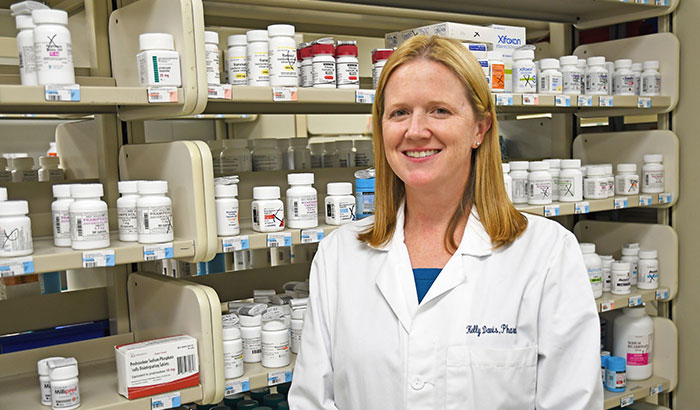Office of Research & Development |
 |


Kelly Davis, a pharmacist at the Lexington VA Medical Center in Kentucky, is part of a team working to reduce inappropriate use of proton pump inhibitors. (Photo by Candace Woods)
December 20, 2017
By Mike Richman
VA Research Communications
"As a whole, we’ve found that the program has decreased our unnecessary PPI use."
They are among the most popular drugs on the market. They are also a much-overused class of medications.
They’re called proton pump inhibitors (PPIs). Examples include the brands Nexium, Prilosec, and Prevacid.
PPIs are the most potent drugs for producing long-term acid reduction in the stomach. Millions of Americans take them for ulcers, heartburn, or acid reflux. They are effective and well-tolerated when used properly.
However, studies show that up to 60 percent of PPI prescriptions may lack an evidence-based indication, meaning they are used without a clear purpose. Long-term use of PPIs has been linked to pneumonia; low levels of magnesium; bone fractures; higher risk of heart attack; Clostridium difficile, a bacterium that can cause symptoms ranging from diarrhea to life-threatening inflammation of the colon; and an excess risk of death.
With the potential misuse of PPIs in mind, staff at the Lexington VA Medical Center in Kentucky implemented a PPI stewardship program. The program, which has been running for nearly two years, is aimed at decreasing unnecessary PPI use and reducing the risk of serious side effects.

VA researcher works to improve antibiotic prescribing for Veterans

Veteran interest in Gulf War Illness reflected in new research study

Study: Delaying colonoscopy following abnormal stool test increases risk of colorectal cancer
Essentially, a team of pharmacists and internal medicine specialists at the Lexington VA is assessing the appropriateness of keeping Veterans on PPIs during hospitalization and after discharge. The team is removing the patients from PPIs when there is no clear purpose for their use and seeing who can tolerate discontinuation.
Inpatients who continue to experience symptoms, such as heartburn, can request permission from their providers to resume taking PPIs. Outpatients may resume PPIs on their own if their symptoms persist but are encouraged to discuss alternative medications with their providers.
Kelly Davis, a pharmacist in critical care at the Lexington VA, says the program has been very successful.
“The whole facility has bought into it, including our primary care providers,” she says. “The awareness of the program, coupled with the fact that physicians are seeing more evidence of the risks of long-term PPI therapy, has led providers to be very cautious when prescribing PPIs.”
“As a whole, we’ve found that the program has decreased our unnecessary PPI use,” she adds. “Now that we’re nearly two years into the program, we’re seeing it’s harder and harder to find patients where we can stop their PPIs. That’s because many patients with unclear reasons for PPI therapy have already had their PPIs stopped through our program or by primary care providers over the last two years.”
Davis co-authored a study that provides the most definitive analysis of the PPI stewardship program. The study, which appears online in Hospital Pharmacy, covered the program’s first five months (March 2016 to August 2016). It aimed to determine the percentage of patients who tolerated inpatient and outpatient PPI discontinuation, as well as dose reduction following discharge.
Other goals included identifying factors that may contribute to the inability of patients to be taken off PPIs due to heartburn symptoms; finding the likelihood of gastrointestinal complications after PPI discontinuation; and specifying the number of patients who required acid suppressive therapy—a class of medications that includes antacids or H2 receptor antagonists, such as Pepcid—as a substitute for PPIs.
In the study, 537 patients already on VA or non-VA prescribed PPIs were admitted to the Lexington VA mostly for reasons unrelated to PPI therapy, such as lung or heart ailments. The patients averaged 71.5 years in age.
Out of that group, 220 people failed to meet the inpatient criteria for continuing on PPIs (see sidebar). Davis and her colleagues found that 211 of those inpatients tolerated PPI discontinuation and 176 did not require acid suppressive therapy. The hospital stays averaged four days.
Upon discharge, the team counseled 42 of the patients to stop their PPIs, with 24 tolerating discontinuation at three months. The researchers also told 22 of the patients to reduce their dose from twice to once a day; 18 tolerated that decrease at three months.
Davis and her colleagues felt that the risks associated with long-term PPI use without a clear purpose outweighed the benefits of PPI continuation.
“PPIs are very good drugs for treating many acid-related conditions,” she says. “But they appear to be over-prescribed, and more and more we’re hearing about the adverse effects associated with that. It seems that a lot of our patients didn’t appear to have a good reason to be on PPIs. So we thought we were probably exposing some Veterans to more harm than good by continuing them.”
One of the team’s concerns, Davis explains, is that patients who were taken off PPIs or had reduced doses may develop complications, such as ulcers. Evidence suggests that some patients experience excess acid after abrupt stoppage of PPIs. In the trial, only one patient experienced complications after being told to stop taking them. That person developed reflux esophagitis two months after discharge, then restarted his PPIs and experienced no complications, according to Davis. She says the patient was not re-hospitalized.
Esophagitis is an inflammation of the tube that carries food from the throat to the stomach. It can cause heartburn, ulcers, bleeding, chronic scarring, and painful swallowing.
PPI misuse is not a problem unique to Veterans. It’s well-established that PPIs are overused in general, with many Americans turning to the PPI series for relief of frequent heartburn, or gastroesophageal reflux disease.
All PPIs are part of the American Geriatric Society’s 2012 Beers Criteria, which lists potentially inappropriate medications to be avoided in older adults, with a focus on the side effects. The Beers list, which is widely used in the medical community, was updated in 2015.
Once PPIs are prescribed, providers often do not stop them even if the patient’s symptoms are under control, according to Davis. For over-the-counter purchases, the U.S. Food and Drug Administration recommends that PPIs be taken only to treat frequent heartburn, and for no longer than 14 days. Though the active ingredient is the same in the prescription and OTC versions of the drugs, patients who need PPIs on a longer-term basis—or for other gastric conditions—are advised to take the drugs with a prescription and supervision from their primary care provider.
The PPI class has existed for about two decades. But Davis says only in the last 5 to 10 years have studies shown that patients who are on PPIs long-term may be at higher risk for pneumonia, fractures, low magnesium, and other debilitating side effects.
A VA-led study released earlier this year suggests a possible “excess risk of death” among PPI users. The researchers note that the risk increased among those with no documented medical indications for PPI use, namely gastrointestinal conditions, and with extended length of use. They urged the medical community to limit use and duration of PPIs to “instances where there is a clear medical indication and where benefit outweighs potential risk.”
The long-term observational study included data on more than 6 million users of VA health care.
So given the potential risks, why are patients on PPIs for extended periods?
“From our experience, most prescribers do not give a stop date,” Davis says. “PPIs are often prescribed for symptoms of heartburn, and these symptoms do not often resolve in 10, 30, or 90 days. Heartburn is often a chronic condition, so PPIs are often prescribed for years at a time.”
She adds that proton pump inhibitors are sometimes thought to be a “quick fix,” with doctors prescribing a PPI rather than a drug that may not be as potent. “That might work in some patients but not in others,” she says.
In terms of the PPI stewardship program, Davis says officials at three other VA hospitals—Indianapolis, Tennessee Valley, and Southern Nevada—have indicated they are pursuing similar endeavors. She’s uncertain if any non-VA facilities are proceeding with programs that monitor PPIs but wouldn’t be surprised if that’s the case.
“Word is getting out about the adverse effects of PPIs in light of several studies in recent years describing the risks,” she says. “Many hospitals are starting to take a closer look at whom they’re prescribing PPIs. They recognize that hospitalization presents a good opportunity to re-evaluate medications patients are taking home to ensure that all are appropriate.”
She adds that it may be harder to implement this type of program in a non-VA setting, noting that many Veterans at the Lexington VA, for instance, have been using that hospital for 20 years. “So I can look through their records and see exactly when they started their PPI and if they tried any other agents first,” she says. “At an independent or university hospital, personnel often lack access to those records.”
The next step in the PPI stewardship program may be to implement a follow-up period following discharge of perhaps one to two years. Davis and her team believe that doing so will likely provide a clearer picture of the number of patients who need to resume their PPIs.
The Lexington VA’s stewardship program included criteria to determine whether it was proper to keep the inpatients on their proton pump inhibitors (PPIs).
The list included 11 elements. But the inpatients only had to meet at least one to stay on their PPIs while they were hospitalized.
—Mike Richman
VA Research Currents archives || Sign up for VA Research updates